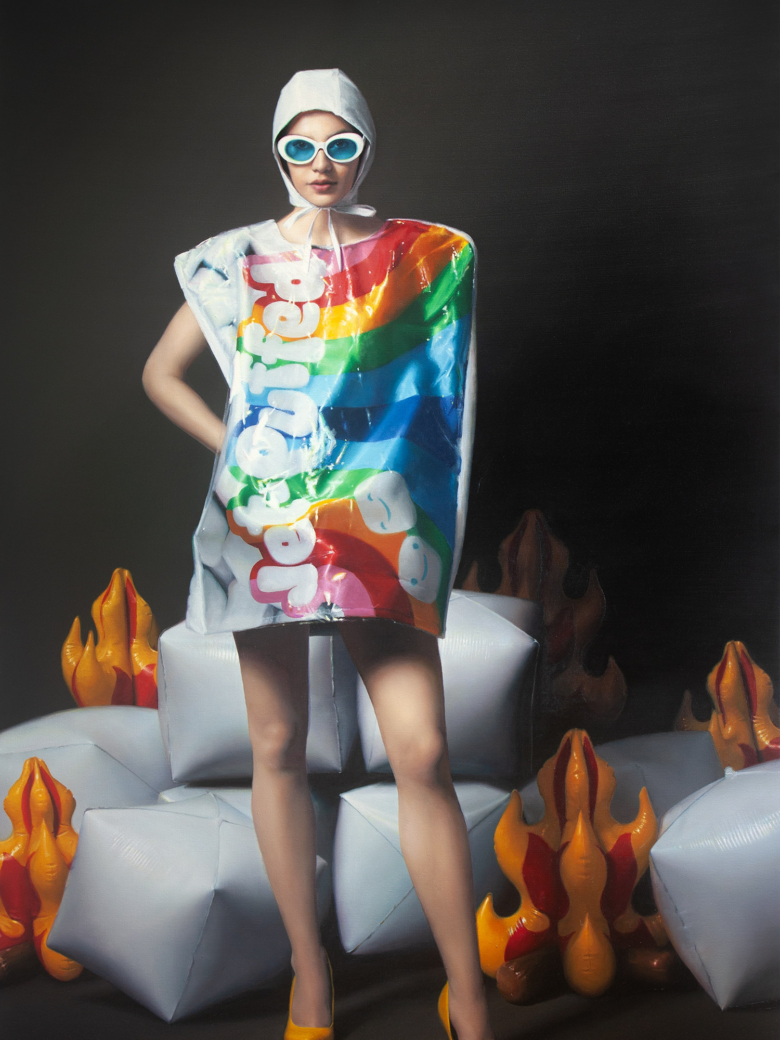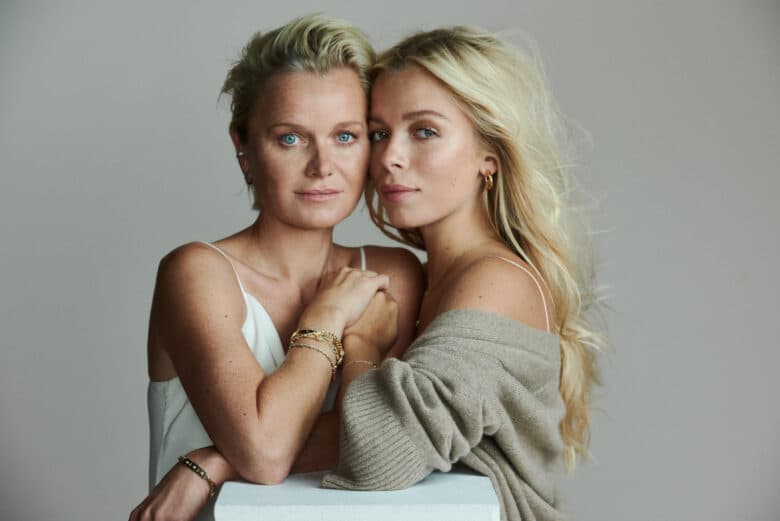Tinie on his musical and fashion evolution: “As a rapper from London, it was difficult to establish myself without being stereotyped”
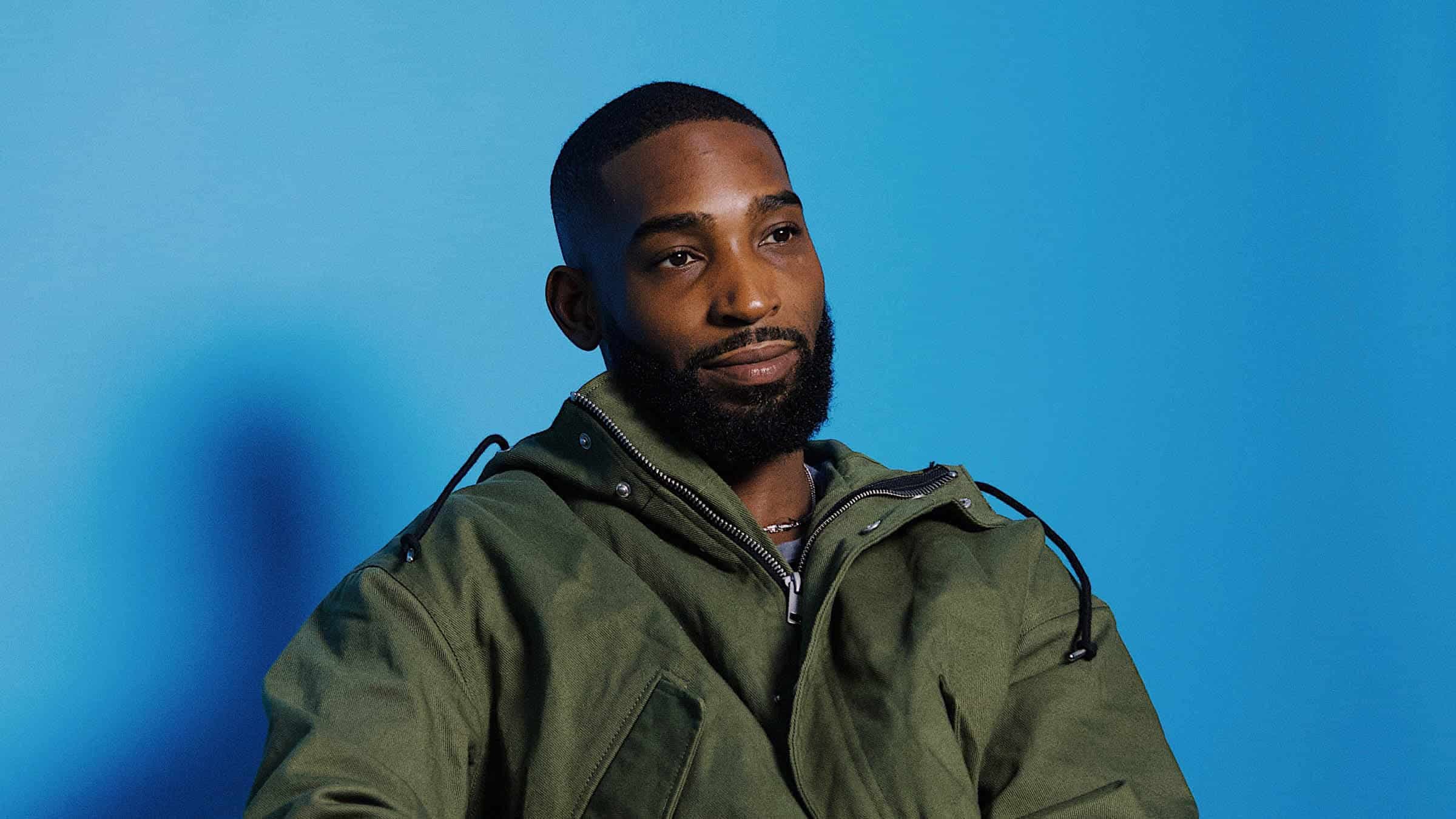
UK legend Tinie (formerly known as Tinie Tempah) has spent over a decade in the spotlight. Whether he’s topping the charts, taking charge of one of his many business ventures or rocking a fit so fresh you almost can’t believe it, Tinie has succeeded in every avenue he’s explored. It’s safe to say the musician is a trailblazer, continuously breaking down barriers throughout his career. Despite the success of the likes of Dizzee Rascal and Skepta, UK hip hop barely stood a chance on the charts at the time of Tinie’s come up. Tinie, however, has become one of this country’s biggest success stories, and he’s not done writing his name in the history books just yet. Label head, designer, TV presenter, and fast food restaurant owner are just a few of Tinie’s side hustles (to call them side hustles is an understatement). Inspired by the great entrepreneurial minds of the legendary Jay-Z and P Diddy, Tinie hopes to create opportunities for his community, providing a helping hand he wished he had as a young musician on the rise in London.
While his passion for music is undeniable, another creative outlet Tinie has always adored is the medium of fashion. From the iconic Disc-Overy era shades to being named the UK’s best-dressed man by GQ, Tinie is leaving his stamp on the fashion world for us all to see. Recently, the multi-hyphenate took his fashion chops to a new level as he partnered up with iconic British mainstay brand Ben Sherman fronting their AW22 campaign, cementing himself as a style icon. Here, Tinie sits down with HUNGER to discuss working with the iconic brand, fashion regrets and the evolution of the UK music scene.
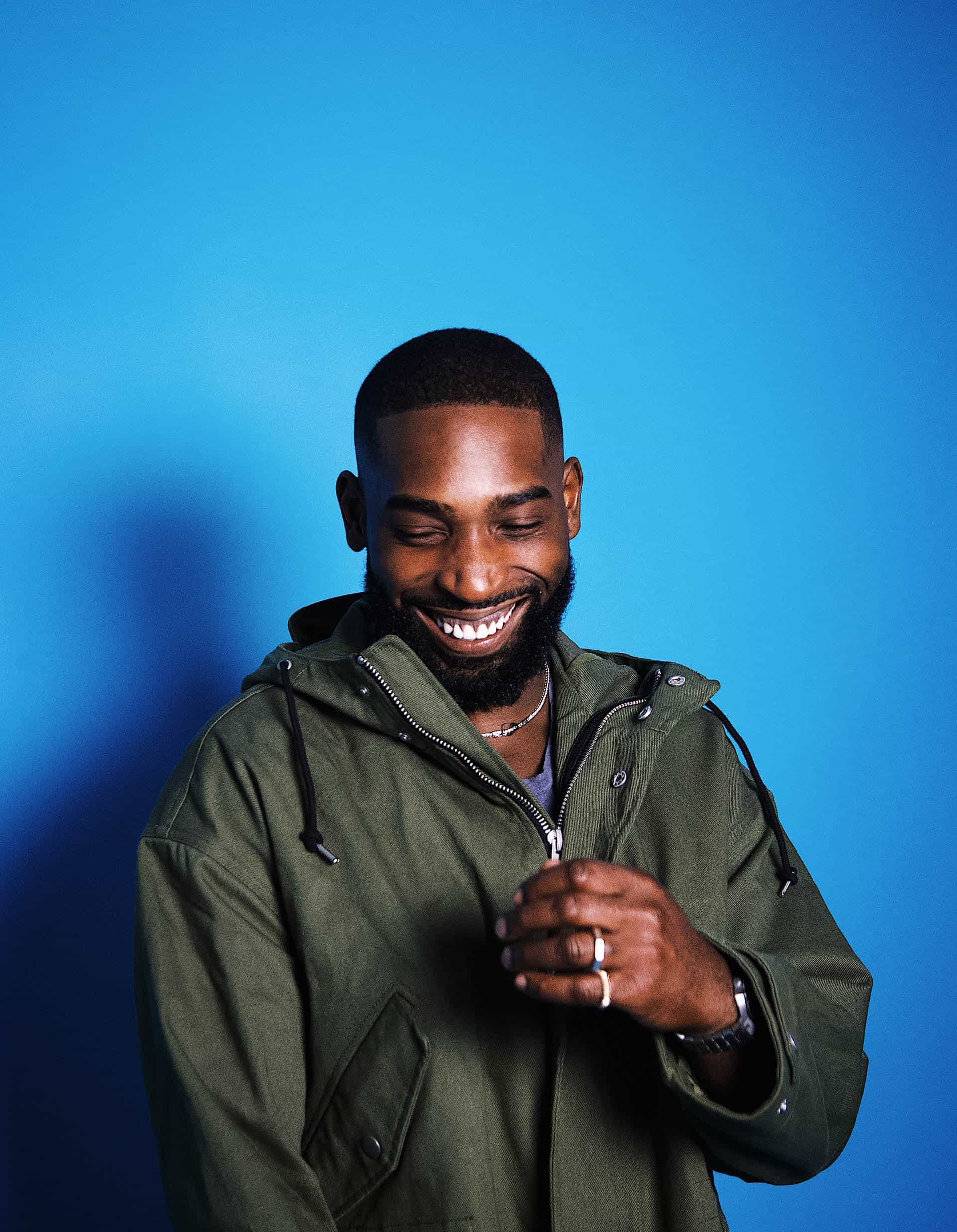
So, Tinie, how would you describe your style at the moment?
I would say that my style is contemporary with a bit of a twist. I like to put a bit of a twist on everything I do. I think I’m on a spectrum of established British brands or up-and-coming British brands that are trying to enter the streetwear space. So I’m really trying to embrace all the brands from the culture, but trying to wear them with my identity.
You do many things, but what role does fashion play in your creativity right now? And how has it historically played a role in your expression?
I think fashion is a real indicator of one’s identity. When you think about fashion and style it has the power to say a lot about someone – who they are, what they’re into, and what side of the fence they’re on to a certain degree. As a rapper from inner city London, it was quite difficult to establish myself without constantly being stereotyped. I was put in a box and told, “you’re a kid from a council estate. We know the story; we’ve heard the story before.” I think fashion was my way of polarising people and making them think about that a bit more and challenging them. I still think it has that power within everything I do, whether it’s music, all the business hats I’ve got on, food or TV. Fashion always has the power to do that, and it’s an ever-evolving thing too.
Speaking about where you come from, what is it like getting to work with such a British staple like Ben Sherman?
It’s amazing to work with a brand with British heritage like Ben Sherman. My school was a predominantly white working-class school. For a lot of the kids, when they were going to football matches, or go to Blue Water, which is the nearest shopping centre, Ben Sherman was always the thing. They always had the Ben Sherman shirts with the logo or a nice little cotton jumper. I remember looking at Ben Sherman jumpers and shirts and thinking, “why can’t I get that? Why can’t my parents get me this?” I desired it a lot. So to actually be in a position now where they’re giving me a call and saying, “we want you to front this campaign,” is amazing. They’re doing even more than that by supporting up-and-coming talent, so it’s interesting, it’s exciting.
What three words would you use to describe Ben Sherman?
It would have to be British, classic and heritage.
Fashion and music have always had quite intertwining relationships; how does fashion feed into music for you and vice versa?
When I think of audio, the next thing I think of is the visual. When I think of certain iconic records, iconic artists, I can immediately visualise, and I can remember what the video was. I remember what they were wearing, so if I say Britney Spears ‘Hit Me Baby,’ for example, there’s a clear visual there. You can remember what she was like, what she was wearing and probably even some of the dance routines. So, I’ve always thought, “what can you do visually to stand out and be a cut above the rest?” I started performing when I was 16, so a lot of the people in the crowd were pretty much the same age. I would look in the crowd and see Mark had this pair of trainers; Lucy had this jacket on, immediately I was thinking, I can’t look like them. Because what’s gonna separate me? I understand there are artists who look exactly like their audience, and it also works. But, for me personally, I was like, “I’m a rapper, I need to be a cut above the rest.” When you think about rappers, you think of extravagance and ostentatiousness, even. So, I needed to jazz my stuff up; I can’t look like everyone else. That’s where fashion really came into play because through music, people can hear, feel and understand the artist. But through fashion, it’s all visual, and I don’t think a lot of people acknowledge this, but what you wear, how you wear things, it says a lot about you. When I think of Lady Gaga, Madonna or even Andre3000, these are people who have used fashion within music to make statements. When I had my opportunity, I knew what I wanted to do with fashion. There was no one who had come from our space that was considered fashionable by the status quo. There was in America, but not here in the UK.
What fashion tip would you give to someone who’s feeling a bit insecure about their style and hasn’t quite figured out their look yet?
I would say that fashion and style is a medium to be able to express yourself. What tends to happen with fashion and style is you have a few people that dictate it and decide on what’s cool, and then everyone follows that, especially when you’re a certain age. So I would say to a younger person that this is your opportunity to be as individualistic and unique as possible. This is your opportunity to say as much about yourself, without speaking, as you can.
Have you ever had any cringe fashion moments?
Definitely. Growing up, I had a lot of American idols, American rappers and whatnot. So I remember at the time my mum was actually in the clothing trade but in her own sort of ghetto way. She used to fly all over the world; she’d go to America and certain parts of Europe and pick up textiles, fabric or already-made pieces. And when she was in America, the already made pieces, and the thing that was being desired by her clientele, which was kind of fellow people from the Nigerian community, was all this American wear. So like Sean John and G unit, all of these different brands at the time, she used to bring it all home. Because it was all imported, I felt like it was better. I just felt like it was the thing. And so I was wearing like all this oversized stuff – which is great, I wear a lot of oversized stuff – but I was wearing all these baggy American jeans with sweatbands and stuff like that. Like Nelly in the ‘Hot in Herre’ video. Maybe a couple looks like that that I regret.
How do you feel looking back on that Nelly look now?
I feel like people always want you to be embarrassed, but really all throughout your life, you’re just trying to find yourself. You’re just trying to work out who you are and where you sit, and I think that is just me as a young teenage boy with a lot of influences just trying to figure it all out. But I won’t be doing it again!
You said before that brands like Ben Sherman are such a British staple, how do you think the brand embodies that sense of Britishness?
In terms of the history of Ben Sherman, I’m not gonna lie and say I know the full history and I think it’s rare that anyone knows the whole history of any brand. However, growing up, it was the desired brand at the time. All the boys I was hanging around with wore it, and it was a brand I couldn’t fully access. I think there was a relevance, aesthetic and a dress code almost for sporting events that you’d go to with your dad or uncle – again something I didn’t really experience much of. But I would see all of these English boys, so to speak, within this culture and Ben Sherman was like the uniform for those traditions. That’s when I clocked onto it and realised there was clearly something going on there. When I think of Britishness, at the time that felt very British. Being Nigerian born in England, having very Nigerian parents that wouldn’t do that, I used to look at that like, “wow, man, that looks cool. I wish I could get into that.”
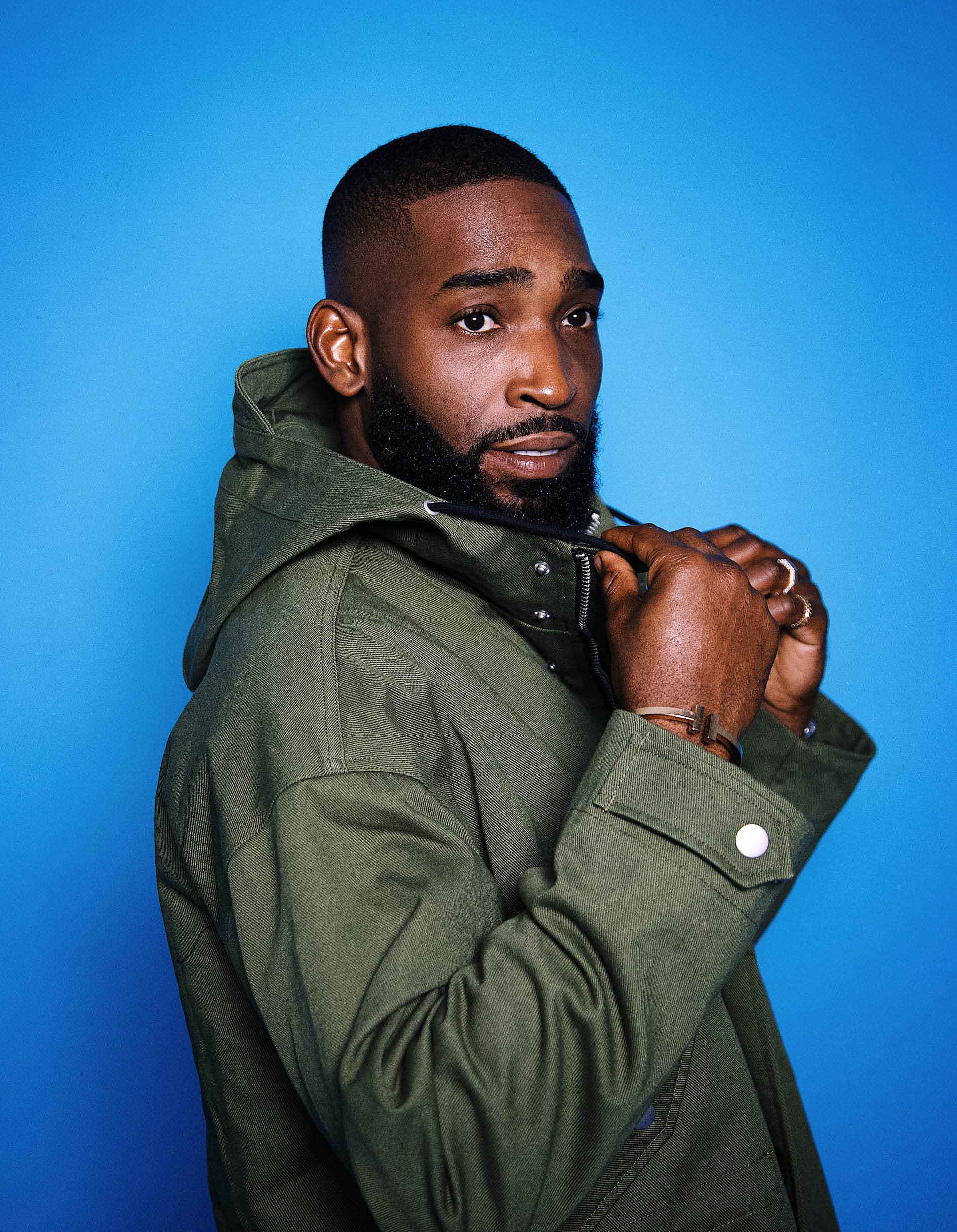
I guess that feeds into the pride of being British and growing up in London as well?
Exactly, it does. It fuses that pride of growing up in London and having that British sensibility for sure.
Moving away from fashion, what are your feelings on the current UK music scene as opposed to when you were coming up?
I think it’s more exciting than it’s ever been, we’re definitely living in a time where attention is sometimes of more value than the actual music itself. But, you know, people have always had to consider PR and things like that. I feel like the playing field is level; there’s so many independent artists who are doing so well that they don’t need the backing of a major record label – and that, to me, is very exciting. However, there are 100,000 songs uploaded to DSPs every day, which makes it so saturated and difficult. And no one ever hears the majority of those. It’s definitely an easier and more exciting time, but you have to make sure you’re doing everything to get everyone’s attention.
Who are some of your favourite artists working today?
I like Jim Legxacy, I like what he’s trying to do. He’s infusing throwback UK songs with contemporary ideas and melodies, which sounds pretty exciting to me. I like Bree Runway, too; I like what she represents. It’s nice to see an act of that magnitude and creativity coming out of the UK. She’s obviously very fashionable too, so I really like her. I like Clavish, too, I think as a rapper, he’s amazing.
Do you see yourself stepping into the role of an OG for the younger generation in music?
Yeah, I feel like I’ve been an OG since the beginning. It’s definitely fair to say I’m one of the outliers, one of the trailblazers. So many people have come before me, but I’ve realised that my sweet spot is breaking down a door and doing something new and innovative. When I think of an OG, I think of someone who people can look at, who people can follow and is a good leader. I feel like I’ve been that for maybe over 10 years already.
So you’re a rapper, musician, record label boss, designer, property developer, an investor, and you have your own fast food business. Was it always in the plan to do it all?
Definitely not. If I just said yes, it would obviously be a lie. Going back to what I was saying about American idols, a lot of them went on to be ultra-successful and still are to this day. The likes of Jay-Z, P Diddy, I saw these guys have ownership first and foremost. They were in the music business but took ownership as opposed to just giving everything away. Secondly, I saw them diversify and move to other areas where hip hop culture was still super influential. But they were selling products and investing in other people’s ideas and businesses, so I followed that to a certain degree. As an artist, I’ve been fortunate enough to follow that because you have to have success and disposable income to do that. I’m 34 years old, I’m young in my mind and there’s so much I want to do. Music is everything to me but what I’m trying to achieve and why I think I’ve been put on this earth, is way bigger than music.
Music is one of the ways I’ll be able to convey a message. Growing up as a young Black boy in the city, it’s been hard. It’s not easy. And when I look out there at certain elements of my community, it’s hard. There’s a lot to be done in my mind. Building these things is going to show other people that they can do the same thing. It’ll create opportunity, jobs and hopefully build generational wealth. And these are all things I’m very passionate about. It wasn’t always in the plan, but here we are.
Who would you attribute your entrepreneurial eye to?
Again, I’d probably attribute that to the American pioneers. However, my firsthand example of a role model would be my mum. I watched this woman who came from Nigeria not settle for whatever society was trying to say she was or what she deserved or should have. When I think of my property portfolio, my mum’s is just as extensive, if not more. She’s not playing around, and she’s still going to this day, constantly redefining what an African woman from Nigeria can do. I always think if she can do it, then I have no excuse.
